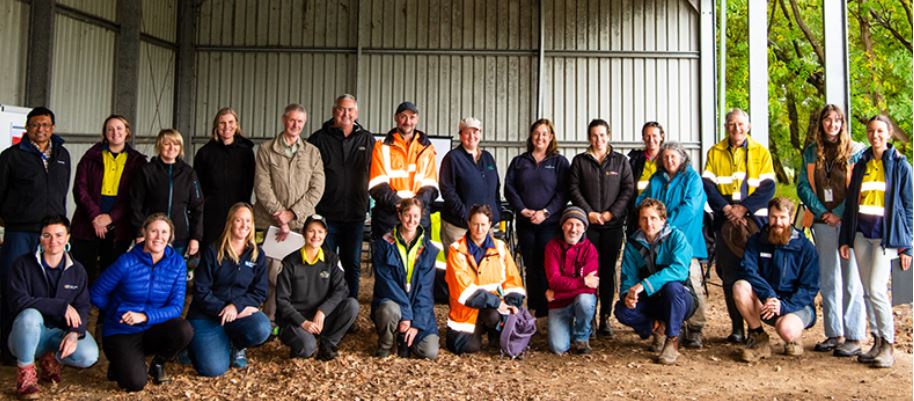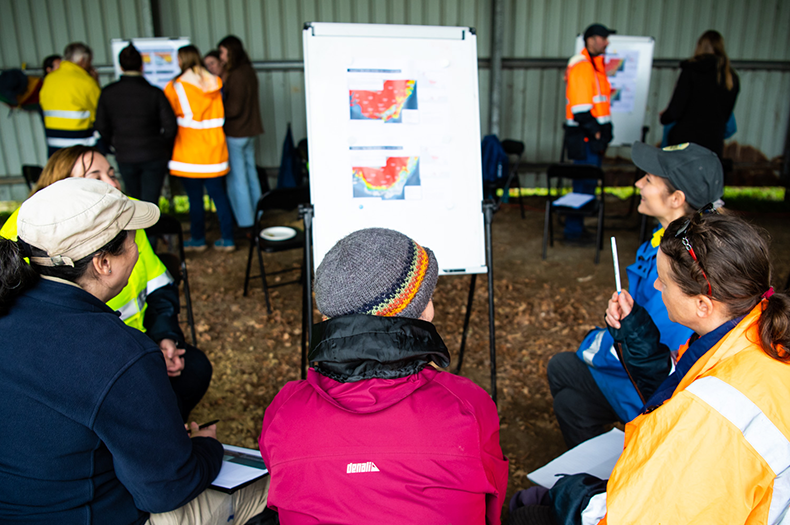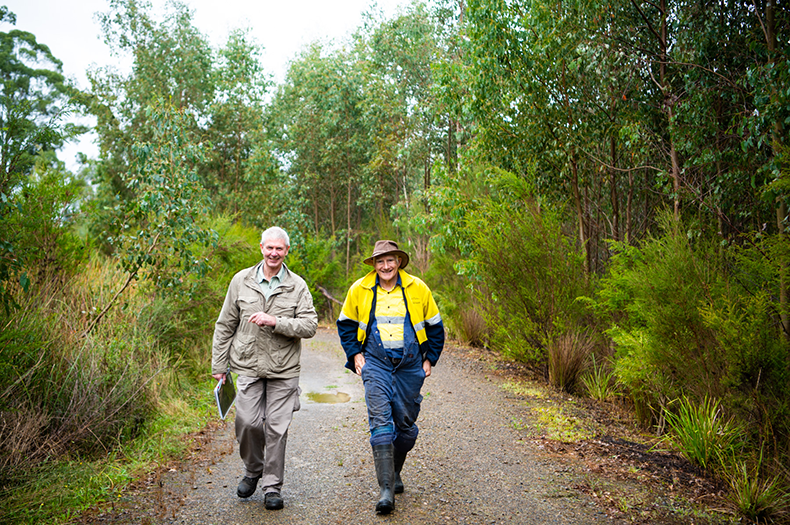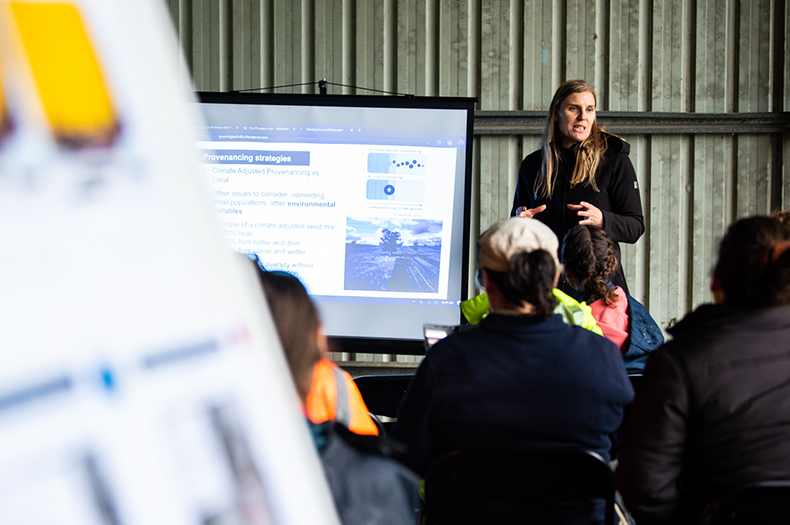February 24th, 2024Roads, paths and climate: Ballarat’s priorities revealed

Road maintenance, the improvement of cycleways and footpaths, and increasing investment in climate change have emerged as top priorities for the community in the City of Ballarat’s 2024/25 Annual Budget consultation.
The consultation occurred throughout October last year. It followed the announcement that the City of Ballarat was changing its budget engagement processes in which there would be a singular round of consultation ahead of the 2024/25 budget development process instead of the previous two rounds of consultation — one prior to the development of the budget and one following its development.
The comprehensive, earlier engagement period was designed to improve upon past engagement processes to ensure the council is better informed of residents’ priorities within the context of the council plan 2021-2025 prior to beginning the development of the annual budget.
The new budget engagement process will also allow the council officers to present the budget to councillors at the May council meeting — a month earlier than previous years.
The October consultation resulted in improved levels of engagement, with the following themes also emerging out of the engagement process:
- Improved waste management and recycling
- Increasing investment in recreation and sporting facilities
- Improved town planning / reducing urban sprawl
- Increased investment in council buildings
Council officers are now using the information gathered through the consultation process, along with a review of the City of Ballarat’s 2023/24 year to date financial performance, to develop the 2024/25 annual budget.
The financial performance review ensures the City of Ballarat’s financial position is consistent with the objectives set out in the 2023/24 budget and long-term financial sustainability objectives.
Updated budget forecasts for the 2023/24 financial year will be presented to the council at the 28 February council meeting.
The budget will be reviewed and workshopped by councillors during March and April and is scheduled to be considered for adoption at the May council meeting.
City of Ballarat Chief Executive Officer Evan King said the City of Ballarat was actively seeking to improve consultation processes to ensure residents’ priorities are reflected in decision-making and in strategic documents, such as the Annual Budget.
“I’d like to thank all community members that contributed to the budget consultation,” he said.
“In order to prepare a balanced budget, we need to ensure it can fund the core services and strategic objectives contained in the Council Plan, along with any additional initiatives.
“This will require council to consider such variables as borrowings, cost efficiencies and the level of revenue we are able to raise, given the minister for local government has set the rate cap for the 2024/25 financial year at 2.75 percent.”
January 21st, 2024Flood mitigation workshop for farmers

Early next month the Hepburn Shire Council will host a workshop to help local farmers work on strategies to deal with the increasing prevalence of extreme weather events.
The workshop will take place at Creswick’s Doug Lindsay Recreation Reserve from 9am-1pm on Thursday February 8.
Mayor, Cr Brian Hood, said that unseasonal and extreme weather was unfortunately becoming more prevalent locally and across the globe.
“We are helping farmers take a more proactive approach to farming practices to prepare for such events and therefore minimise damage to valuable crops and livestock,” he said.
The council has organised a lineup of highly regarded keynote speakers that will present case studies outlining proactive initiatives for local farmers.
“This kind of extreme weather is a reality and we need to be prepared. Farmers will hear from skilled agricultural professionals on solutions that can be modified to prepare farm infrastructure and livestock for future extreme weather events,” said Cr Hood.
Speakers scheduled for the event include:
- Dr Kirsten Barlow (Principal Scientist) – Precision Agriculture
- Geoff Ross – Precision Agriculture
- Andrew Bohay – Civil Agricultural Design
- Sinead Barker – Meridian Agriculture
- Mark Hutchings – Hutchings Plant Hire
The event is funded by the Victorian Government through Emergency Recovery Victoria’s grant program in response to the 2022 Floods which impacted Victorian communities including residents and farmers of Hepburn Shire.
More details and registrations are available through the council’s website.
September 27th, 2023Red Rebels taking action on climate crisis

Central Vic Climate Action is hosting a number of events to encourage creative action in response to the escalating environmental crisis: a parade of Red Rebels, and screening of the film How to Blow Up a Pipeline.
Red Rebels from Melbourne, Castlemaine and Ballarat will gather in Bendigo on Monday, September 25 to support Castlemaine activists attending Bendigo Magistrates Court.
Red Rebels are an international performance activist troupe dedicated to illuminating the environmental crisis and supporting groups fighting to save humanity and all species from mass extinction.
“Red symbolises the common blood we share with all species, and shows our empathy with our surroundings,” said Serena Everill from Central Vic Climate Action.
“We are on the precipice of a catastrophic climate breakdown, yet National Australia Bank continues to drive us closer to the edge by funding fossil fuel projects.”
Red Rebels are supporting Central Vic Climate Action members Bernard Tonkin, Dean Bridgfoot and Laura Levetan, who were handcuffed in Bendigo’s National Australia Bank earlier this year, for refusing to leave NAB because the bank would not rule out funding a new coal mine.
Laura said they would be representing themselves and pleading not guilty “on the basis of sudden or extraordinary emergency”.
“Show of support at the Bendigo Magistrates Court on the morning of September 25 is very welcome.”
Opening on September 28 at 7.30pm, is the environmentalist action thriller How to Blow Up a Pipeline, presented by Central Vic Climate Action, Castlemaine Theatre Royal and School Strike 4 Climate.
The story follows a group of young people in their plan to blow up an oil pipeline and explores the moral validity of extreme actions in addressing the climate crisis.
“Members of Central Vic Climate Action are wanting to stir up the conversation about how we are responding to the status quo where our leaders and financial institutions continue to actively support the fossil fuel industry, in full knowledge that they are destroying the future of our planet,” Serena said.
“We are certainly not advocating the use of violence, but we are suggesting that we all need to step up and onto the street. We will be having a Q&A and proceeds of the night will go to Castlemaine School Strike 4 Climate.
“Central Vic Climate Action group welcomes all who want to get involved in local climate action.”
Email: Centralvicclimateaction2@gmail.com or check the Theatre Royal website for film details.
A NAB spokesperson said the organisation respected the right of people to protest. “However when these activities impact the safety and wellbeing of our colleagues and customers we will call police.”
Words & image: Contributed
July 31st, 2023Can we cope? workshops for a changing climate

Sustainability, conservation and restoration practitioners from Melbourne and Yarra Valley regions recently gathered for a recent workshop facilitated by Greening Australia at Haining Farm to explore practical and innovative approaches to managing landscapes for future climates.
Knowledge exchanges to support effective, practical and immediate action are increasingly vital as Australia is seeing the largest documented decline in biodiversity of any continent.
“The more we learn about what’s driving biodiversity loss, the more complex it is for land managers to navigate ways forward for protecting and restoring Australian ecosystems – for example, ensuring that populations have the genetic diversity and adaptive capacity to survive in changing climates,” said Greening Australia’s Zoe Birnie, who organised the workshop.
“Applying climate-adjusted approaches in the real world is challenging. There’ll be compromises and trade-offs – but we really wanted to encourage practitioners to share their experiences and see that even putting a few principles from science-based tools and guidelines into practice is better than none.”

Sharing ideas and experiences can help inspire environmental practitioners with new ways to approach managing climate impacts on landscapes. Photo: Annette Ruzicka.
Those attending on the day included representatives from state and local governments, universities, utility companies, and natural resource management organisations.
Workshop participant Monique Miller from Bush Heritage said: “Unpredictability is one of the biggest challenges. There’s a cascade effect of biodiversity breaking down. How can we make restoration sustainable with those missing puzzle pieces that are becoming evident all of the time?
“Workshops like these are helpful because we can discuss different approaches and experiment – which in turn helps with feeling like we’re dealing with the unknown. Cross-pollinating knowledge between restoration practitioners is essential to effectively do our jobs. Innovation doesn’t happen in a vacuum.”
Workshop participant Geoff Lockwood from Southern Fauna Resources said: “It’s useful to know there are future planning tools available for site rehabilitation; it’s challenging to know how to choose a strategy for the future if we can’t be sure what’s going to happen with such a variable climate. But it’s how you look at it: do we see sites where rehabilitation has not worked as a failure, or as a learning and keep adapting?”

Workshop participants Geoff Lockwood (L) and Alan Scoble (R) in conversation, walking among thriving revegetation at Haining Farm. Photo: Annette Ruzicka.
Melinda Pickup, Greening Australia’s Manager of Seed Science, presented to the group on emerging seed tech that will feed into practical climate-adjusted approaches to conservation and restoration.
“We really believe in the sense of collective momentum that’s gained when you get people together to share knowledge and experiences and brainstorm ways forward. In the seed science field, for example, we’ll soon be seeing approaches that bring together a practitioner’s on-ground understanding of an ecosystem with the underlying genetics of a species.
“We’re talking about finding parts of the genome that are relevant to climate adaptation, and unlocking that potential by relating that back to the practicalities of what we can do on ground.
“There are always limitations to any approach, but that’s where bringing people together is so valuable – so we can fill in the gaps and form a more holistic solution.”

Greening Australia’s Melinda Pickup explains to attendees how seed genetics, influenced by their provenance, can support practical approaches to climate ready revegetation. Photo: Annette Ruzicka.
Haining Farm provided the perfect setting for these discussions. It exemplifies the opportunity to use restoration sites as knowledge hubs for practitioners, where new ways of working can be tested and the learnings shared to improve conservation and restoration efforts.
Parks Victoria Ranger and workshop participant Melissa Tuliranta said: “Haining Farm has a long history as an environmental education centre, so it’s great to see a workshop like this with people from various organisations unpacking a complex topic and sharing ideas.”
“It’s exciting to be working in a space where we are looking into implementing a whole new approach to future revegetation projects to create climate resilient habitat. It is truly inspiring to see so many organisations and individuals interested in the topic and making their way to Haining Farm to learn more about it.”
July 28th, 2023Aviation sector in climate change spotlight

Australia and the United Kingdom have highlighted shared ambitions for decarbonising aviation the federal transport minister, MP for Ballarat, Catherine King says.
In a media statement released earlier this month, Catherine King MP said that the Albanese Government supports the International Civil Aviation Organisation’s initiatives to reduce greenhouse gas emissions from international aviation without constraining while still facilitating growth in the industry.
With questions increasingly being raised about the signficant role aviation is having in exacerbating climate change, Ms King’s media statement issued on July 19 also asserts that:
“ICAO’s initiatives include the adoption of a long-term aspirational goal for international aviation of net-zero carbon emissions by 2050 and the implementation of the Carbon Offsetting Reduction Scheme for International Aviation.
“In meetings this week with UK ministers, including Baroness Vere of Norbiton, Parliamentary Under Secretary of State (Aviation, Maritime and Security), we have discussed shared ambitions and initial progress in decarbonising aviation, as well as the UK’s experience so far in encouraging an industry-government partnership approach through its Jet Zero Council.
“In meetings this week with UK ministers, including Baroness Vere of Norbiton, Parliamentary Under Secretary of State (Aviation, Maritime and Security), we have discussed shared ambitions and initial progress in decarbonising aviation, as well as the UK’s experience so far in encouraging an industry-government partnership approach through its Jet Zero Council,” Ms King said.
“Just last month I announced the Australian Jet Zero Council, which is due to meet for the first time in August, bringing together stakeholders from across our aviation industry and its fuel supply chain to identify opportunities to decarbonise the sector.
“The Council will support Australia’s aviation industry and government to collaborate in achieving emissions reductions on the path to net zero, including through increased use of sustainable aviation fuels, adoption of emerging technologies and making operations more efficient.
“I look forward to continuing to work across government, with industry and with international partners to drive the decarbonisation of aviation and secure a greener, more sustainable future.”








